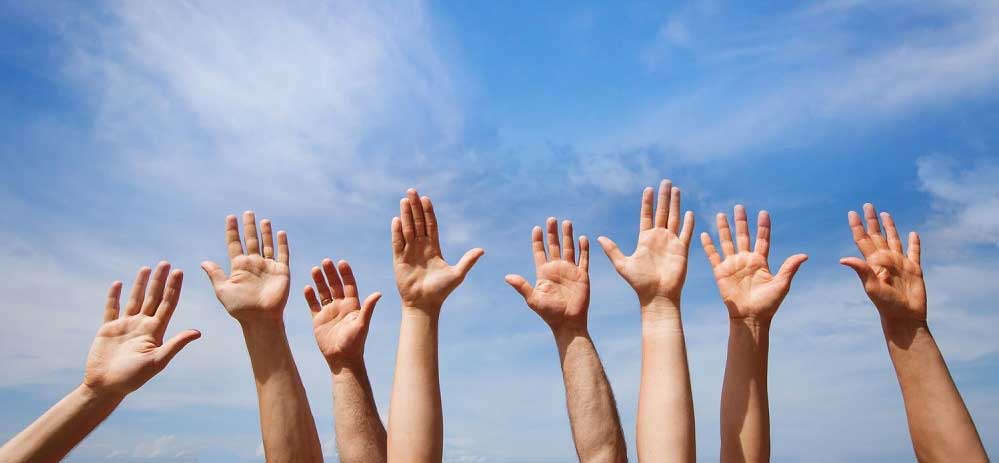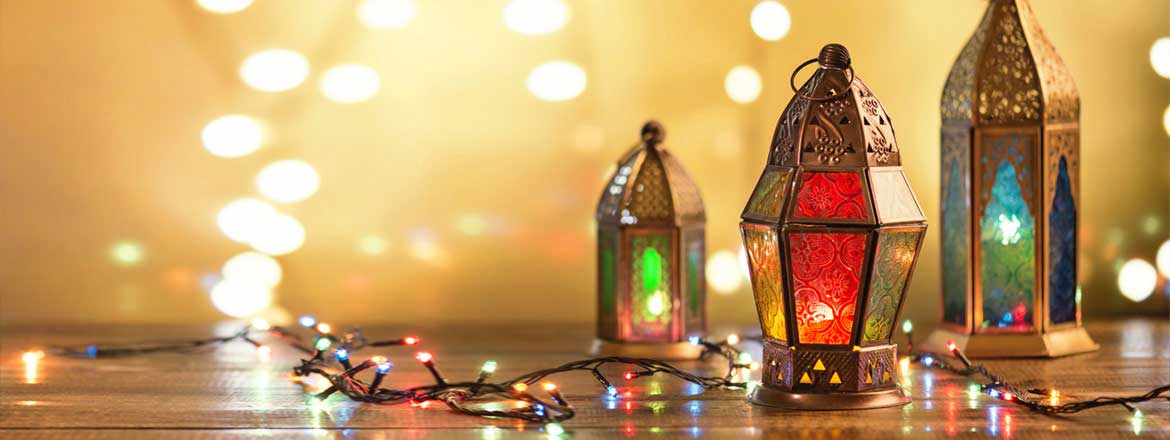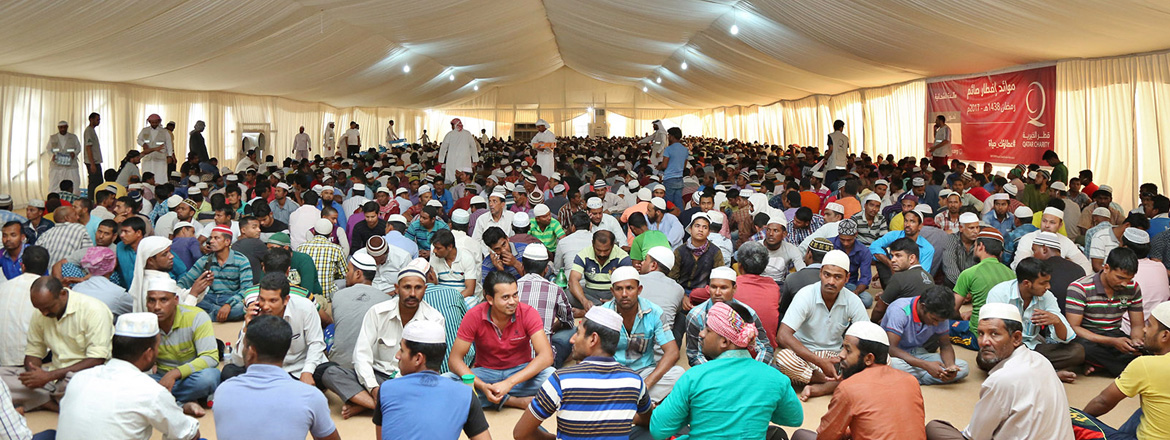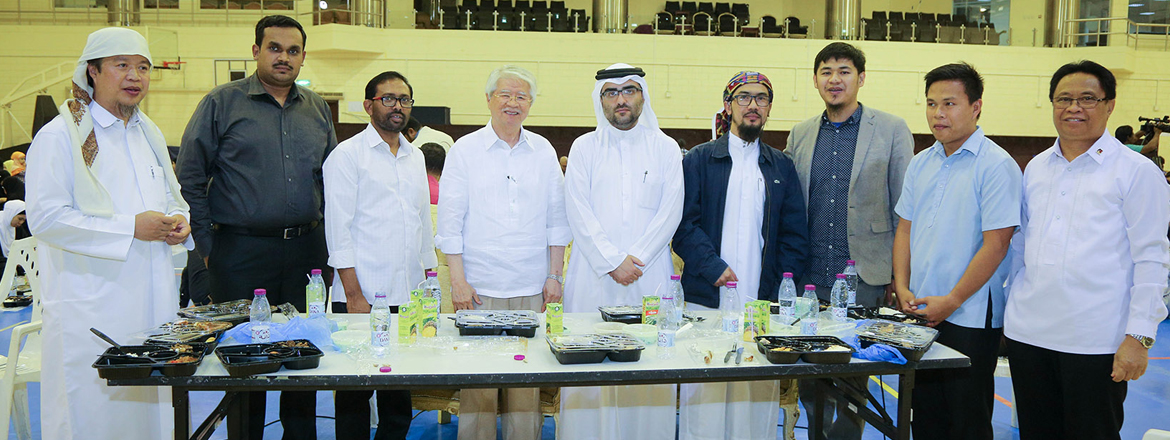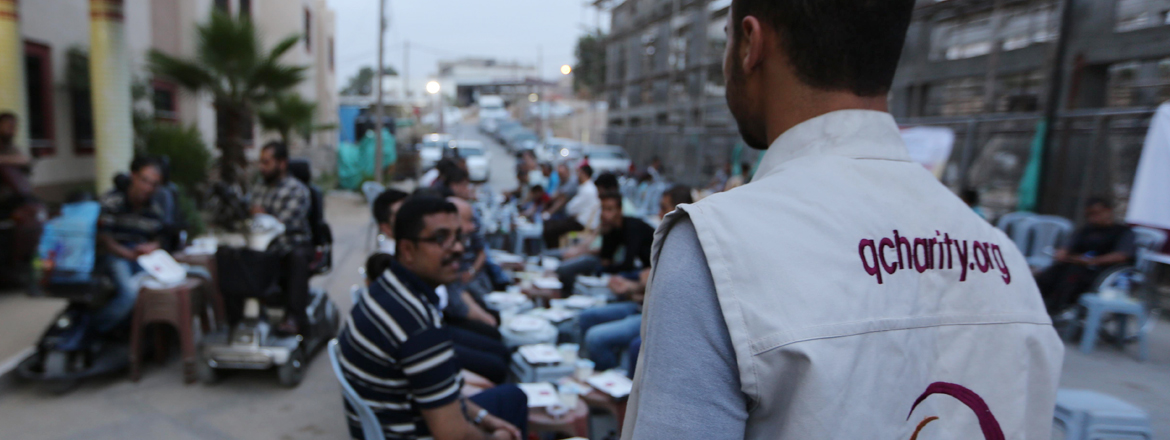Orphans of Gaza break their fast at QC’s Iftar tables

2018-05-27T11:39:01+01:00

"Every year, we eagerly wait for the holy month of Ramadan so that we can eat together at Iftar Tables. Our feeling of happiness is indiscernible when we break the fast with our family members in a euphoric spiritual atmosphere”.
This is how Sami Ahmed, a 14-year-old boy, expressed his pleasure at attending Iftar tables organized by Qatar Charity in the Gaza Strip for orphan and their families.
"We are happy with the programs implemented with the support of philanthropists in Qatar, which always carry love and familiarity for us, and let us feel that we are not less fortunate than our peers," added Sami Ahmed.
The mother of the child, Mohammed Abdullah, expressed her happiness at attending these events that contribute to easing the economic burden on the families of orphans. "We are happy that with time, we and Qatar Charity have become one family”, the mother said. She stressed that the cash aid provided to orphans, significantly help them, especially in the difficult economic conditions of the Gaza Strip under the siege.
Qatar charity is organizing a number of Iftar tables in various governorates of the Gaza Strip at a cost of QR 824,274, in cooperation with NGOs as part of its Ramadan project for the year 1439/ 2018.
Since the beginning of the holy month of Ramadan, Qatar Charity has implemented three Iftar Projects for Orphans and Poor Families in various parts of the Gaza Strip. Other Iftar projects will be implemented throughout the blessed month.
At the beginning of the blessed month, QC’s office in the Gaza Strip has implemented a clothing project, benefiting 2000 poor children.
Related News
Ramadan Kareem: Tripoli, "Mot
By: Judy Al Asmar
But it is also Tripoli, "Mother of The Poor" where one can enjoy the best of what the city offers, especially in food and clothing, for a small price. Unfortunately, nowadays, it is "the Mother of Poverty " after recent studies revealed it to be the poorest city on the Mediterranean.
In this city, where 60% of the population live below the poverty line, the dominant Islamic identity shines in its most definite form during the holy month of Ramadan, when the benevolent hands gather for initiatives to feed the underprivileged.
Tripoli has well-established charity organizations that double their food aid in Ramadan. Thus, this city is witnessing the emergence of initiatives by the youth to provide food through purely voluntary efforts and individual donations.
To name but a few, the “Ambassadors of Good” initiative has, for eight years, been targeting orphans and disadvantaged people throughout the month by delivering hot and delicious food to their homes on a daily basis. This group of young men and women from various Lebanese regions is active in Tripoli and northern Lebanon. Their efforts are coordinated by Professor Nada Hamdash: "Our primary objective is not to make those whom we help feel embarrassed or humiliated, but to treat them as we would like to be treated. We are also concerned with doing an excellent job and providing quality food. " The activities of this group are diversified and include different age groups. Hence the "Iftar Ramadan" project has witnessed a significant development. In the first year, Iftar meals were distributed to 300 people. In the second year, there were 2000 beneficiaries. In the eighth year, this number reached 28,000 beneficiaries throughout Lebanon (Beirut, Tripoli, the north, Sidon and Wadi Al-Zayneh). Donations are usually raised through an annual charity Iftar, zakat funds, and individual contributions mostly collected from people of the middle class. The non-working university youth form the core of “Ambassadors of Good.”
The "We Love Tripoli" youth association is another example. This group, for the past 7 years, have been organizing Iftar meals for orphans in the most deprived areas. They began with one Iftar for orphans in the year, until it was able, during the last three years, to manage and organize three Iftars for orphaned children each year. The founder of "We Love Tripoli” Taha Naji's explains the concept of their work: “We take a group of orphan children to a restaurant, and every young volunteer is responsible for one child during Iftar. The activity concludes with leisure facilitated by the group". Through the association's relations with other credible local organizations and beneficiaries in the areas of Tebbaneh, Jabal Mohsen, Al-Tanak district in the port and others, children are referred to "We Love Tripoli" to participate in Iftar. As operators are aware that volunteering does not necessarily mean that a volunteer must donate for Iftar, the option to raise donations from outside the association is open for all.
Social solidarity in Ramadan takes an integrated approach in the works of “Basma and Yasma” youth initiative. This initiative was launched by the efforts of two young men and a woman from the most marginalized areas of Jabal Mohsen and Bab El Tebbana in Tripoli, an area known for its sectarian rivalries. The group met a year ago to provide food supplies collected from small shops in the two regions as means to the revival of the local economy and sell to individuals and institutions that want to provide food support for families, especially during the month of Ramadan. Ms. Marwa Baker, a participant in the initiative, explained: “We have integrated unemployed youth and school dropouts into this effort to contribute to the preparation and transfer of supplies to needy families, and to take advantage of the financial benefits we derive from “Basma and Yasmeh” at competitive prices.” One of the founders of the initiative, Mr. Hassan Saleh, points out that their food contributions are provided to five local and international associations
The Tripoli historian, Professor Omar Tadmari, affirms that this social fabric in the Holy Month has not come as a result of a recent phenomenon. He claims that it is based on similar experiences that took place in the second half of the twentieth century, as in the school of Qadiriyah in the copper market before it became a mosque. This area, for 30 years, was occupied by a free restaurant based on contributions of the middle-class people who used to buy raw materials, prepare food, and deliver it to the deprived during Ramadan and throughout the year.
Note: The article expresses the opinion of the author solely and does not necessarily reflect the viewpoint of Qatar Charity.
The Story of a Lantern
By: Rochdi Boumedine
Ramadan is a month like no other. It is a symbol of forgiveness, devotion and celebration. Alongside with its spiritual aspect and long fasting days, Ramadan Kareem lives in our collective memory of as a fascinating social and cultural event. It stretches back in history, and conjures vivid images of all those who celebrated it before us, weighed with their traditions and festivities. Ramadan exudes an atmosphere of its own, and whenever there is Ramadan, there is something differently exciting happening somewhere, call it tradition, or maybe culture, or just pure magic. Ramadan is a cultural tapestry that encompasses all, yet it is celebrated differently in every corner of the world.
One of the most prominent icons of Ramadan’s celebrations is the Fanoos, the Arabic for Lantern that has always accompanied Ramadan, embodied its festive spirit and celebrated its arrival. The Lantern tradition was born in Cairo Egypt, and carried on through generations to come.
There are many tales about how the lantern tradition started, however they all lead to Cairo during the Fatimid Islamic Caliphate reign nearly a thousand years ago. One story goes on when the Caliph Al-Muizz Lideenillah was on his way for the sighting of Ramadan crescent, he was accompanied with Cairo’s children holding lanterns and singing Ramadan songs.
It is fascinating that the Ramadan lantern has survived the captivating power of time and change. Lantern has remained a symbol of the holy month of Ramadan, and was charmingly incorporated with a rich oral literature in Egypt and some other neighboring countries in the Middle East and North Africa. Songs like Wahawi ya Wahawi (metaphorically meaning the light of fire), and Bint El Sultan (The daughter of the Sultan) are still sung by nowadays children and echoing in the streets of Cairo upon the coming of Ramadan. The Ramadan lantern is a story of a happy child, a colorful lantern, and an ancient song.
Ramadan Lanterns are very popular in Egypt; thus it is quite unlikely where an Egyptian household does not have a colored lantern. They come in all different colors, sizes, and shapes. Some of them can be as high as two to three meters, while there are those with key-ring size for the kids to play with. Fawanees (Plural of Fanoos) also can show a beautiful display of Arabic calligraphy with verses of the holy Quran, Allah’s names, or some other Ramadan greetings like Ramadan Kareem that can be seen in Iftar Tents, city streets, and on Cairo balconies.
The lanterns industry used to be solely Middle Eastern. However, over the past decade, a wave of lanterns imported from China invaded the market, and became very popular especially amongst children. The Chinese lantern gained popularity due to using batteries instead of candles, and also because of its cheap price in comparison to its local counterpart. Subsequently, the Egyptian government decided to stop importing the Chinese lanterns and ban them from the market in the hope of bringing back the local lantern, and preserving a handcraft that is already facing many daunting challenges in a time of technology and smart machinery.
Note: The article expresses the opinion of the author solely and does not necessarily reflect the viewpoint of Qatar Charity.
QC Ramadan Projects to benefit
Through its Ramadan Campaign “Giving is the Secret to Happiness”, Qatar Charity (QC) is expected to reach out to 630,000 fasting persons in Qatar during the holy month by implementing a number of projects and programmes at a cost of about QR16mn.
During the blessed month of Ramadan, Qatar Charity is implementing various types of projects, which include many Iftar projects for fasting persons, targeting workers and community gatherings in particular, and Iftar meals and Zakat Al Fitr projects for low-income families.
The charily also is organizing a number cultural programs, events and supporting voluntary initiatives, in partnership with others, which include Baraha, Humanitarian Action Event, Youth Initiatives Competition, Al-Siddiqiyoon, You're not alone and Moaayashah (Coexistence).
The most significant Ramadan projects are as follows:
Iftar Tables for Fasting Persons
This year, Qatar Charity is organizing 39 Iftar tables in several areas of the country such as Al Khor, Dhakhira, Simaisma, Kharttiyat, Al Gharafa, Al Rayyan, Al Shahaniya, Al Wakrah, Al Wukair, Muaither South and North, Al Sailiya, Bin Omran, Bin Mahmoud, Umm Salal Mohammed, Al Kabaan, Al Aziziyah,Izghawa, Old Al Ghanim, Al Montazah, Ain Khalid, Al Shamal, Freij Abdul Aziz, Al Hilal, Rawdat Rashid, Al Jamiliya, and Barzan.
During the whole month of Ramadan, these tables will target 225,000 fasting people with the focus on single workers, passers-by and low-income earners and provide them with ready Iftar meals to break their fast.
Iftar Meals for Single Workers
The project focuses on single workers and serves ready Iftar meal to them with the focus on bachelor gatherings. This project is being implemented in Al Ghuwariyah, Simaisma, Al Khor, Al Khuraib, Al Shahaniya, Abū Nakẖlah, and Al Wakrah. Around 18,000 people are expected to benefit from the project.
From Home to Home
As part of this project, Qatari families prepare and serve Iftar meals to low-income families with the aim of meeting some of their needs in Ramadan. As many as 6,000 people are expected to benefit from the project.
Iftar Meals for Industrial Zone workers:
This project distributes Iftar meals to workers through special vehicles at the various locations of the Industrial Area, which are daily changed to cover the largest number of workers during the month. This project will reach out to 12,000 beneficiaries throughout the month of Ramadan.
Ramadan Supply
This project provides parcels containing essential foodstuffs for the month of Ramadan, which are distributed to families with limited incomes via coupons gifted by Qatar Charity at the beginning of the holy month. About 2000 families are expected to be beneficiaries of this project this Ramadan.
Mobile Iftar
This involves the distribution of snacks prepared by Qatari productive families to motorists who were not able to reach their homes for Iftar. This Ramadan, it is expected that 15,000 drivers will benefit from the project.
Providing Water to Congregations
The project is underway in 43 mosques in cooperation with the Ministry of Endowments and Islamic Affairs in order to distribute water bottles to congregations while they are performing Taraweeh and night prayers. As many as 242,000 people are expected to benefit from this water project during this Ramadan.
Ramadan Gift
This is financial aid provided to low-income families registered with Qatar Charity before the beginning of Ramadan to meet the living needs in the holy month. The number of beneficiaries reached as many as 1,000 families this year.
Al-Aqraboon
This is an initiative implemented by Qatar Charity for the third consecutive year with start of Ramadan, in which a number of media figures and social media influencers will participate, with the aim of providing financial aid to the needy families, who may not visit charities for help as well as supporting difficult cases within the country.
Zakat ul Fitr
It is given to low-income families on the occasion of Eid al-Fitr. The number of beneficiaries is expected to reach 1,000 families.
Eidi (Gift) for Orphans
It is a gift distributed to the Orphans Sponsored by Qatar Charity, before Eid al-Fitr, to bring pleasure to them. This year, Eidi will be gifted to 324 orphans.
7,500 people from Asian commun
For the fifth consecutive year, Qatar Charity (QC) is implementing its ‘Baraha’ program, to benefit more than 7,500 people from different Asian communities living in Qatar with the aim of supporting and strengthening the spirit of diversity, dialogue and interaction, especially in the holy month of Ramadan.
Baraha Program includes collective Iftar Tables for different Asian Muslim communities residing in Qatar. Also, awareness, cultural and entertainment activities are organized by the Friends Cultural Center, a Qatar Charity Center For Community Development, in coordination with clubs and forums of these communities.
The communities benefiting from the program include Sri Lankan, Filipino, Indonesian, Bangladeshi, Nepali, Pakistani (speaking Urdu) and Indian (speaking Malayalam) communities in addition to the Tunisian community.
The Director of Projects and Centers at QC’s Executive Management of Local Operations, Fareed Khaleel Al Siddieqy said Baraha Program is aimed at making people aware of Islamic values, strengthening the spirit of faith and promoting the values of solidarity and exchange among members of communities, especially in the holy month of Ramadan.
Al Siddieqy added that the program also is aimed at enhancing societal cohesion, intercommunity co-operation and partnership and solidifying and expanding the array of opportunities of cultural interaction for different Asian communities residing in Qatar, noting the positive impact of this annual Ramadan program that includes social, cultural, recreational and awareness activities.
He thanked those hosting these Iftar Tables at their headquarters such as Al-Arabi Sports Club and Qatar Sports Club for their cooperation in implementing this program within the framework of social responsibility.
Iftar tables have so far been organized for Sri Lankan, Pilipino, Bangladeshi, Pakistani (Urdu speaking), and Indonesian communities, benefiting, 1250, 500, 1000, 1000, and 500 people respectively, whereas other tables will be implemented within the next few days as part of Baraha Program.
2900 disabled to benefit from
Since the beginning of Ramadan, Qatar Charity has continually been implementing a number of Iftars in Gaza with the aim of benefiting around 2,900 people with special needs, who receive complete Iftar meals.
QC’s “Feed a Fasting” project includes organizing ten Iftars for people with special needs in different governorates of the Gaza Strip. So far, six Iftars have been implemented since the beginning of Ramadan, whereas the remaining four iftar will be organized during the coming days of the holy month.
Mohammed Jalal, who suffers from a motor disability, expressed his pleasure in attending QC’s Iftar table in Gaza along with his five-year-old child, saying "Thank God there are still people who remember the disabled and set up Iftar tables for them". He also thanked the people of Qatar for providing their continued support to him and his family and those with special needs.
Engineer Mohammed Abu Haloub, Director of Qatar Charity Office in the Gaza Strip, said giving a great attention to people with special needs stems from the teachings of Islam, which encourage supporting the poor and needy.
He stressed that Qatar Charity spares no effort to alleviate the suffering of these people, who are the most needy in the Gaza Strip, as they do not have any fixed-income sources. He also lauded QC’s efforts to bring joy and pleasure to the needy and poor people in Palestine.
This year, Qatar Charity is implementing 50 collective Iftars in the Gaza Strip, targeting various groups such as orphans, poor families, prisoners, people with special needs, Quran Teachers, cleaners, municipal workers, fishermen and others.
Around 15,000 people are expected to benefit from the Iftar project. The cost of the project, implemented in cooperation with NGOs and partner organizations in the five governorates of the Gaza Strip, is more than QR 800,000. The “Feed a Fasting” project also includes providing 4,000 poor families with food baskets through direct shopping.
